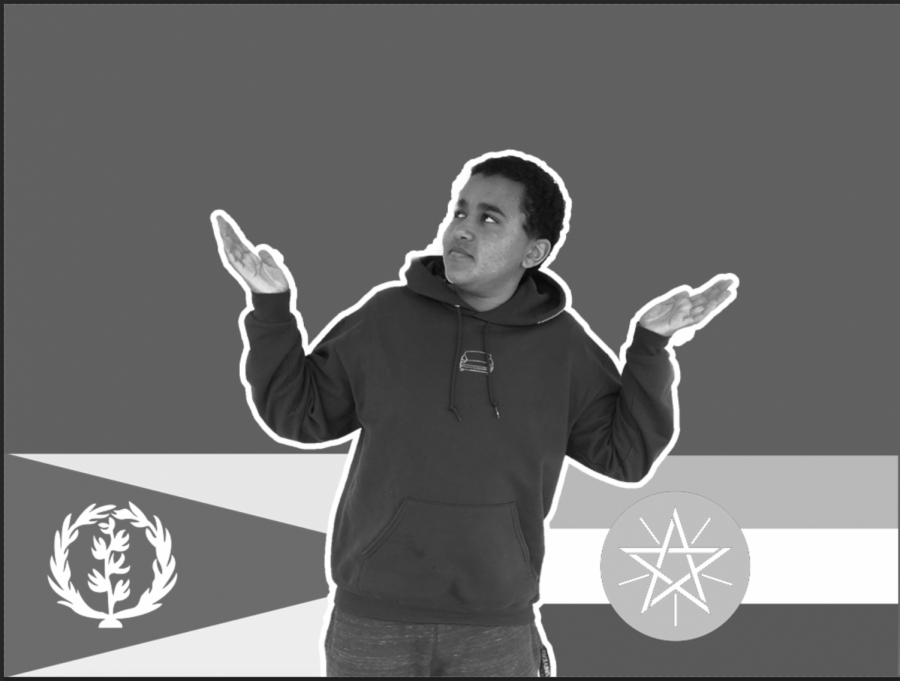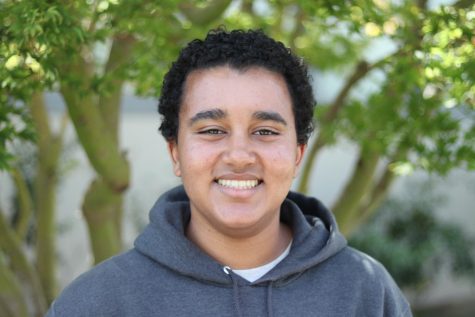Habeshas: It’s Our Time
April 24, 2018
Hi! My name is Noah Tesfaye, I’m from Ethiopia and Eritrea, and no, my family does not starve. Most of us don’t live in shacks, although some of my family does, and we do not have AIDS. As a student of a particular minority group in this area, I struggle to understand the necessity that I must explain who I am, where I’m from and what Ethiopia is like to everyone I know.
Ethiopia and Eritrea are countries that do suffer from poverty and severe corruption, but that does not define who we truly are. We are the only African country that was not colonized by Europe and we are the home of the Ark of the Covenant. We are the origin of human beings and home to that food you eat and leave five star reviews on Yelp about because Mark Zuckerberg went there.
Being Habesha, Ethiopian or Eritrean means you’re part of a culture of resilience. We’ve overcome the Italians, fought against communism, and we are still fighting today for true democracy throughout both countries. I mean, when your uncle has arguments with your Eritrean grandma about how one of her “friends,” Isaias Afewerki, is a dictator putting his people through human rights violations equal to North Korea. There is no shortage of arguments between Eritreans and Ethiopians, and among Tigrays and Oromos and Amharas within Ethiopia itself.
But being Habesha here in the 21st Century, and now in 2018, there are more people who are mainstream who are representing our culture in ways I could have never thought possible. There’s the most famous Habesha in the world, the guy who shares my last name, Abel Tesfaye, better known as “The Weeknd,” who just released his EP three weeks ago and is taking over R&B and pop with his moody, dark tunes. There’s also an Eritrean you may know named Tiffany Haddish, a comedian who starred in “Girl’s Trip” and hosted SNL last fall. Do you know someone named Adam Aminé Daniel, known as “Aminé,” a rapper from Portland with a gold album and a song named “Caroline” that has over 300 million plays on Spotify?
These people are not just citizens who are from Habesha descent; they are people who embrace this culture I’m so proud to call my own, never shying away from expressing their heritage. Abel used samples of the Ethiopian Beyoncé and Aster Awok, and Tiffany Haddish wore an Eritrean dress to the Oscars.
Ethiopia is shown as a place where millions are starving and dying on the news. We’re going through serious government conflict, and we are struggling to find ourselves as a nation. Yet, we are more than that. We are a group of people who have had parents who have struggled to work their way up in the western world to make a name for themselves. We love to make arguments out of nothing and drink any coffee except Starbucks. And we are working our hardest to make a name for our culture, and remind the world, we are more than just the famines or a destination for the humanitarian trips your volunteer group or church take. We are more than our internal conflicts and growing pains into democracy. We are Habesha, and we are not going anywhere.





Gobena | May 29, 2018 at 2:02 pm
Well said Noah! What an excellent way to portray Eriteria and Ethiopia by our youngest and brightest. Your writing gives me hope that Ethiopia and Eritrea will soon be in good hand. Ethiopia and Eriteria are affluent in natural resources but lacks leaders who are free from corruption. Democracy is in the making and we are seeing a glimpse of hope but we need the new blood to take it all the way.
Keep it up Noha!
By the way your dad was one of the brightest during our you ages in school. He was one year ahead of me but Teshager was well known. He was also the best soccer player 🙂
Best,
Gobena
Elias Beshah | May 28, 2018 at 3:25 pm
Well said , couldn’t be explained better, very impressive ?
Marco Toma | Nov 2, 2021 at 5:08 am
Ancora oggi, quando si parla di Etiopia, Eritrea, Corno d’Africa, tutti cadono dalle nuvole, un’area che sembra sconosciuta ai piu’. Eppure, qui c’e’quasi tutto il mondo culturale del Vecchio Continente. Cristianesimo Ortodosso, chiese rupestri, megalitismo africano, ebraismo, Islam, Vicino Oriente antico preislamico, animismo tradizionale, civilta’autoctona locale axumita, architettura europea(Gondar, S. Giorgio ad Addis Abeba, ecc.). L’Etiopia e’bella perche’se ne esce fuori e sta in tutto il mondo(un vecchissimo detto accademico degli orientalisti italiani).
Appunto, deve uscire all’esterno propagandando medialmente ogni suo aspetto culturale, fisico, ecc. in modo che ognuno si renda conto della nazione reale che ha davanti(un Corno d’Africa di millenaria civiltà e non il paese di AIDS, fame, guerre civili).
Bravo, Noah, per questo tuo intervento coraggioso.
Gezahegn Mengistu | May 28, 2018 at 11:28 am
You are inspiration for many Noah, keep up the good work and increase the awareness. I’m very optimistic that our country will soon take the place it deserves, the cradle of mankind.
Gezish